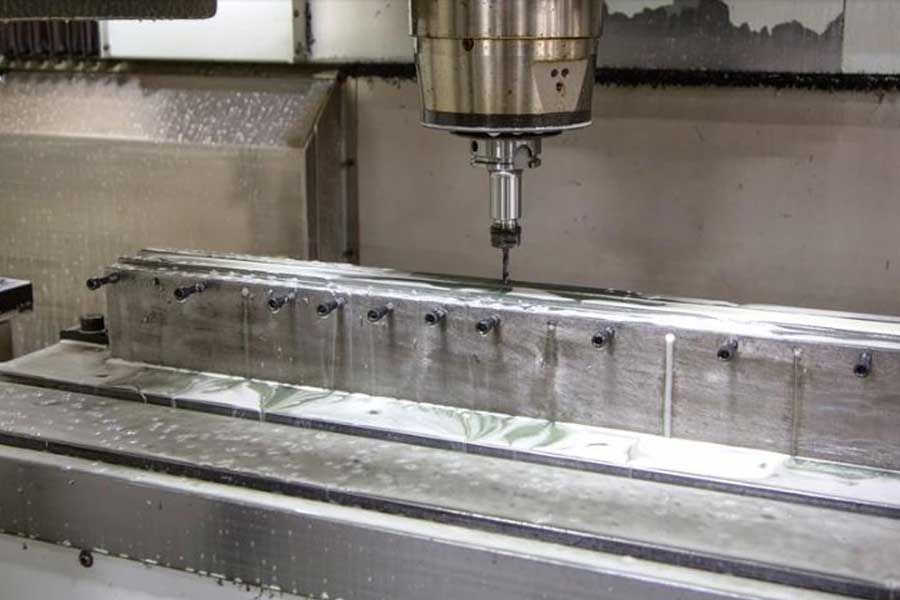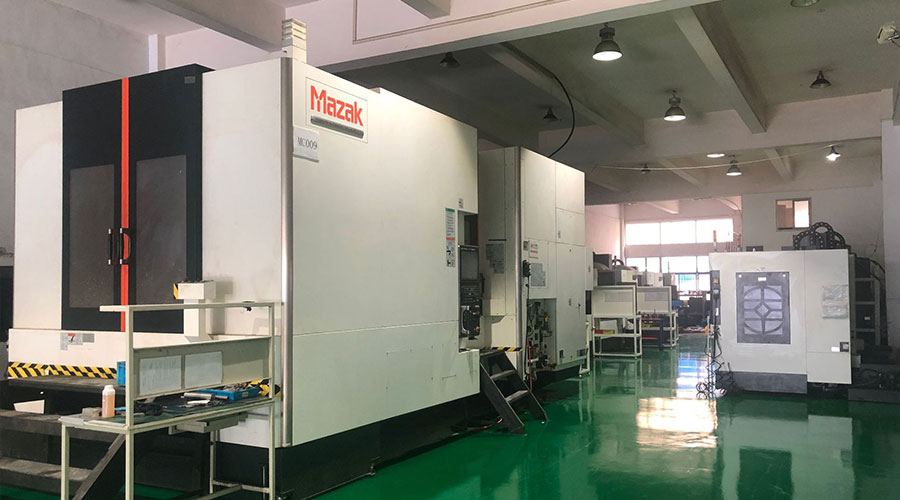The weather in Dalton, Georgia is hot, and Tuftco Corp. produces carpet tufting machines there. These machines have long rows of needles for gluing the carpet thread to the common base, posing special challenges for processing. When the company needed a more precise machine tool capable of handling extremely long horizontal strokes, the XiMill machining center from Bertsche Engineering Corp. emerged as the solution. However, even with new machines, extreme environments and part temperatures require further changes to the process.
A key component of the carpet tufting machine is the needle bar, which has thousands of precision holes up to 210 inches long. The accuracy of these holes is critical to the reliable operation of the tufting machine, because thousands of needles reciprocate at very high speeds during operation. Of particular importance to Tuftco is the accuracy of the bars. These rods wear out and must be replaced regularly. When this happens, the spare part must exactly match the original part.
Tuftco has been manufacturing tufting machines since 1960 and has even introduced new technologies to the industry over the years, including the first wide-width tufting machine. Today, it produces servo-driven tufting machines and carpet finishing equipment.

Despite its success in the past, the company eventually found itself unable to cost-effectively manufacture needle bars with continuously tight tolerances. This led to the decision to change the process by looking for long-stroke machine tools that could meet more stringent manufacturing requirements.
Tuftco needed a machine tool that could work within the manufacturing limits of the existing factory, where the temperature fluctuates greatly in the morning and evening, in winter, and in summer. Tuftco chose Bertsche XiMill for this task, provided that its design has features such as thermal temperature compensation methods that can improve the consistency of part accuracy.
Bertsche XiMill was originally developed for the aerospace industry and is equipped with multiple temperature sensors to measure the temperature of the bed at different positions, the temperature of the parts to be processed and the temperature of the coolant used in the drilling process. Then, the system generates a composite picture of the thermal processing environment. It uses it to apply appropriate temperature length compensation.
The initial installation of the new machine went well, but as production began, measurement problems emerged. The results of the existing method of measuring manufactured parts using the internally developed single-axis laser part measuring machine are inconsistent with the machine’s measurement data. The shop introduced a Faro laser tracker to measure parts, but this provided a different set of results.
These differences force the collective to rethink this issue. The first step is to collect initial measurement data. Tuftco then took steps to better understand the microclimate in the facility by accurately tracking the temperature of the factory, machine tools, and materials before processing. It uses this information to determine the temperature of the part when it is fixed and the relationship between that temperature and the temperature of the machine.
These observations indicate that as long as the part is clamped at higher than ambient temperature (due to previous machining or grinding operations, or when large temperature fluctuations occur in the factory), the part will fail the inspection test.
In order to avoid misunderstandings and restore trust in various measurement processes, measures have been taken to fully understand and educate the staff on how to apply thermal compensation to each measurement device, how to calculate and how to apply it, so that they can confirm whether each measurement device is correct and provides correctness. Reliable data.
Apply better temperature management in factories; control heat build-up in workpieces; reorder milling and reaming operations; select and optimize tools, speeds and feed rates; apply thermal growth correctly even on the hottest days in Georgia Compensation can also achieve a highly repeatable process.
Link to this article: What are the effects of the temperature environment of the machining workshop on the machining of long parts?
Reprint Statement: If there are no special instructions, all articles on this site are original. Please indicate the source for reprinting:https://www.cncmachiningptj.com/,thanks!
 3, 4 and 5-axis precision CNC machining services for aluminum machining, beryllium, carbon steel, magnesium, titanium machining, Inconel, platinum, superalloy, acetal, polycarbonate, fiberglass, graphite and wood. Capable of machining parts up to 98 in. turning dia. and +/-0.001 in. straightness tolerance. Processes include milling, turning, drilling, boring, threading, tapping, forming, knurling, counterboring, countersinking, reaming and laser cutting. Secondary services such as assembly, centerless grinding, heat treating, plating and welding. Prototype and low to high volume production offered with maximum 50,000 units. Suitable for fluid power, pneumatics, hydraulics and valve applications. Serves the aerospace, aircraft, military, medical and defense industries.PTJ will strategize with you to provide the most cost-effective services to help you reach your target,Welcome to Contact us ( [email protected] ) directly for your new project.
3, 4 and 5-axis precision CNC machining services for aluminum machining, beryllium, carbon steel, magnesium, titanium machining, Inconel, platinum, superalloy, acetal, polycarbonate, fiberglass, graphite and wood. Capable of machining parts up to 98 in. turning dia. and +/-0.001 in. straightness tolerance. Processes include milling, turning, drilling, boring, threading, tapping, forming, knurling, counterboring, countersinking, reaming and laser cutting. Secondary services such as assembly, centerless grinding, heat treating, plating and welding. Prototype and low to high volume production offered with maximum 50,000 units. Suitable for fluid power, pneumatics, hydraulics and valve applications. Serves the aerospace, aircraft, military, medical and defense industries.PTJ will strategize with you to provide the most cost-effective services to help you reach your target,Welcome to Contact us ( [email protected] ) directly for your new project.
Link to this article:What are the effects of the temperature environment of the machining workshop on the machining of long parts?
Reprint Statement: If there are no special instructions, all articles on this site are original. Please indicate the source for reprinting.:Cut Wiki,Thanks!^^
